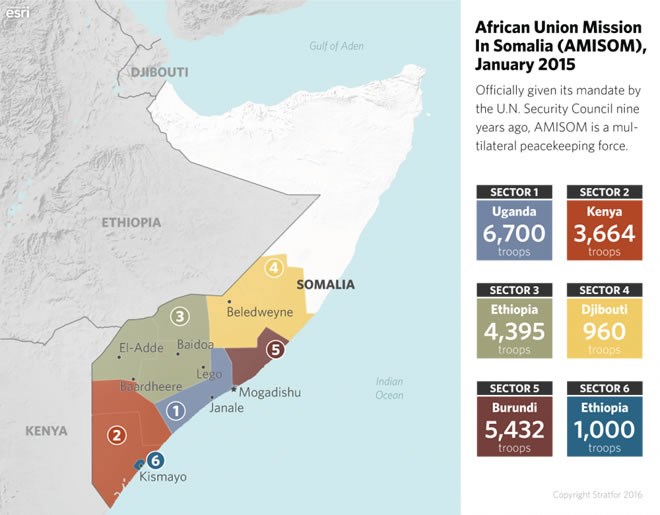
Tuesday, November 29, 2016

Somali police and AMISOM peacekeepers stand guard outside a school in Barawe on Oct. 11. Somalia's fragile security will become even more precarious now that the elections have begun. (ANDREW RENNEISEN/Getty Images)
Summary
After a series of delays and heated political disputes, Somalia's parliamentary elections are finally underway. Though it is still unclear when the vote will be completed, one by one, the seats of the country's upper and lower houses are being filled. Despite the progress Somalia has made in recent years in increasing the transparency of its electoral process, numerous irregularities have been reported as voters head to the polls. Sorting out the results will not be easy, but it will pale in comparison to the task awaiting the next government: taking charge of the country's security as the African Union seeks to wrap up its peacekeeping mission in Somalia, leaving Mogadishu's security services to fend for themselves.
Analysis
The elections were initially supposed to have wound down by now, but so far only three-quarters of the upper house's 54 seats and roughly half the lower house's 275 seats have been filled. Once the remaining lawmakers have been selected, the parliament will convene in the capital to choose Somalia's next president. At this point it is unlikely that a president will be selected by Nov. 30 — the deadline set in the most recent decision to extend elections — even as the vote proceeds at a steady clip.
Somalia's electoral procedures are still in their infancy and have proved vulnerable to tampering. The country's auditor general has even announced that the latest vote's results cannot be considered credible, thanks to numerous accounts of vote-buying, fraud, intimidation and violence. Nevertheless, these concerns probably will not derail the elections: Somalia needs a government too badly, and there are too many vested interests in protecting the country's stability to get hung up on the credibility of a parliamentary vote. After all, Somalia's election procedures were never intended to be representative to begin with, since persistent interference by militants belonging to al Shabaab has made organizing a popular vote infeasible in most parts of the country. As it stands, Somalia's current approach of having political elites and tribal elders select clan delegates and regional officials, who then choose the parliament that subsequently selects the president, is largely a means of guaranteeing progress toward a more secure country, rather than a true implementation of democracy.
Though many expected the al Shabaab extremist group to use violence to try to dissuade citizens from casting their votes, no major disruptions have been reported at the polls. In fact, the elections have been peaceful for the most part, with the exception of a firefight in Jowhar and a local dispute in Galkaayo, a city two Somali states share as their capital. Though al Shabaab continues to operate throughout the country, it is largely confined to rural areas where the elections are not being held. Even so, as one of the greatest threats facing the next administration, the Islamist militants are no doubt at the forefront of every Somali politician's mind.
Somalia's fragile security will become even more precarious now that the elections have begun. The vote has triggered discussions within the African Union to begin pulling peacekeepers out of the country, returning responsibility for Somali law and order to Mogadishu. (The bloc has deployed troops to Somalia for nearly a decade, though they have been concentrated primarily in the country's biggest cities.) African Union forces and U.S. special operations forces are preparing Somali troops for the transition as best they can, and a Turkish-run training base is scheduled to open soon. The Somali military, however, is unlikely to gain the personnel and expertise it needs to take over for the African Union Mission in Somalia (AMISOM) by the end of 2018, when it is scheduled to wind down, let alone to best its record by stamping out al Shabaab completely. Somalia's forces are largely cobbled together from various clan militias, and they continue to suffer from a lack of training, discipline and cohesion.

Aware of these issues, AMISOM is making a last-ditch effort to more permanently secure the country and quash its enduring insurgency for good. To that end, it has requested another 4,000 troops, on top of its current 22,000, though it remains to be seen whether contributing countries will agree to commit them. Either way, though the extra manpower will certainly help, it is unlikely to have any dramatic impact on the battlefield. Recent withdrawals by Ethiopia and Kenya from military bases in Somalia's rural regions have given al Shabaab more freedom of movement, and the militants have been stepping up their attacks against AMISOM and Somali troops in the coastal region just south of Mogadishu. According to a recent report, the group's bombmaking capabilities are also improving, making it an even bigger threat.
Al Shabaab has shown that it is still a capable fighting force, a fact that could put the next administration in a tough spot as talk of an AMISOM exit continues. The Somali government may even find itself struggling to keep ahold of the capital, should the peacekeeping force's departure embolden the militants encroaching on Mogadishu's southern outskirts. Despite the African Union's lengthy commitment to the country, and Somalia's continuing political progress, the Somali army's capabilities leave much to be desired. And by all appearances, it will not be ready to stand on its own if the AMISOM mission ends two years from now.
Send us your thoughts on this report